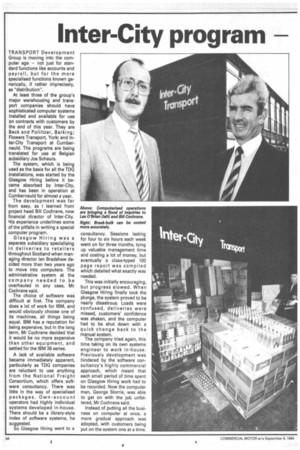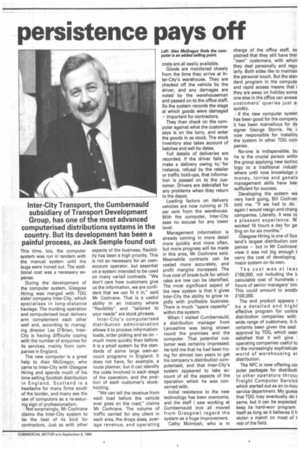Inter-City program
Page 56

Page 57

If you've noticed an error in this article please click here to report it so we can fix it.
TRANSPORT Development Group is moving into the computer age — not just for standard functions like accounts and payroll, but for the more specialised functions known generically, if rather imprecisely, as "distribution".
At least three of the group's major warehousing and transport companies should have sophisticated computer systems installed and available for use on contracts with customers by the end of this year. They are Beck and Pollitzer, Barking; Flowers Transport, York: and Inter-City Transport at Cumbernauld. The programs are being translated for use at Belgian subsidiary Jos Scheurs.
The system, which is being used as the basis for all the TDG installations, was started by the Glasgow Hiring before it became absorbed by Inter-City, and has been in operation at Cumbernauld for almost a year.
The development was far from easy, as I learned from project head Bill Cochrane, now financial director of Inter-City. His experience underlines some of the pitfalls in writing a special computer program.
Glasgow Hiring was a separate subsidiary specialising in deliveries to retailers throughout Scotland when managing director Ian Bradshaw decided more than two years ago to move into computers. The administrative system at the company needed to be overhauled in any case, Mr Cochrane said.
The choice of software was difficult at first. The company does a lot of work for IBM, and would obviously choose one of its machines, all things being equal. IBM has a reputation for being expensive, but in the long term, Mr Cochrane decided that it would be no more expensive than other equipment, and settled for the IBM 36 series.
A lack of available software became immediately apparent, particularly as TDG companies are reluctant to use anything from the National Freight Consortium, which offers soft ware consultancy. There was little in the way of specialised packages. Own-account operators had highly individual systems developed in-house.
There should be a library-style index of software systems, he suggested. So Glasgow Hiring went to a consultancy. Sessions lasting for four to six hours each week went on for three months, tying up valuable management time and costing a lot of money, but eventually a close-typed 100 page report was compiled which detailed what exactly was needed.
This was initially encouraging, but progress slowed. When Glasgow Hiring finally took the plunge, the system proved to be nearly disastrous. Loads were confused, deliveries were missed, customers' confidence was shaken, and the computer had to be shut down with a quick change back to the manual system.
The company tried again, this time taking on its own systems engineer to work in-house. Previously development was hindered by the software consultancy's highly commercial approach, which meant that each small period of time spent on Glasgow Hiring work had to be recorded. Now the computer man, George Storrie, was able to get on with the job unfettered, Mr Cochrane said.
Instead of putting all the business on computer at once, a more gradual approach was adopted, with customers being put on the system one at a time. This time, too, the computer system was run in tandem with the manual system until the bugs were ironed out. The additional cost was a necessary expense.
During the development of the computer system, Glasgow Hiring was merged with TDG sister company Inter-City, which specialises in long-distance haulage. The trunking operation and computerised local delivery arm complement each other well and, according to managing director Les O'Brien, InterCity is having difficulty coping with the number of enquiries for its services, mainly from companies in England.
The new computer is a great help to Alex McGregor, who came to Inter-City with Glasgow Hiring and spends much of his time selling Scottish distribution in England. Scotland is a headache for many firms south of the border, and many see the use of computers as a re-assuring sign of professionalism.
Not surprisingly, Mr Cochrane claims the Inter-City system to be the best of its kind for contractors. Just as with other aspects of the business, flexibility has been a high priority. This is not so necessary for an ownaccount operator, but essential on a system intended to be used on many varied contracts. "We don't care how customers give us the information, we are confident that we can fit it in," said Mr Cochrane. That is a useful ability in an industry where "flexibility" and "tailored to your needs" are stock phrases.
Inter-City's computerised distribution administration allows it to process informationloads, order picking and so on — much more quickly than before. It is a small system by the standards of some large own-account programs in England. It does not have, for example, a route planner, but it can identify the costs involved in each stage of the operation, and the position of each customer's stockholding.
"We can tell the revenue from each load before the vehicle ever goes on the road," claims Mr Cochrane. The volume of traffic carried for any client in each area, the drops sizes, average revenue, and operating costs are all easily available.
Goods are monitored closely from the time they arrive at Inter-City's warehouse. They are checked off the vehicle by the driver, and any damages are noted by the warehouseman and passed on to the office staff. So the system records the stage at which goods were damaged — important for contractors, They then check on the computer against what the customer says is on the lorry, and enter the goods in as stock. The stock inventory also takes account of batches and sell-by dates.
Full details of deliveries are recorded. If the driver fails to make a delivery owing to,' for instance, refusal by the retailer or traffic hold-ups, that information is passed on to the customer. Drivers are debriefed for any problems when they return to the depot.
Loading factors on delivery vehicles are now running at 75 per cent from the warehouse. With the computer, Inter-City sees no excuse for any lower level.
Management information is already coming in more detail more quickly and more often, but more progress will be made in this area, Mr Cochrane said. Meanwhile contracts can be costed more accurately, and profit margins increased. The true cost of break-bulk for which rates are low can be identified. The most significant aspect of the new system is that it gives Inter-City the ability to grow rapidly with profitable business. There is much "spare capacity" within the system.
When I visited Cumbernauld, a distribution manager from Lancashire was being shown round the premises and the computer. That potential customer was certainly impressed. He told me that he had been trying for almost two years to get his company's distribution cornputerised, and that Inter-City's system appeared to take account of all the aspects of the operation which he was concerned with.
Initial resistance to the new technology has been overcomer and the staff I saw working at Cumbernauld (not all moved from Glasgow) regard the system as a huge improvement.
Cathy McIntosh, who is in charge of the office staff, ex plained that they still have thei "own" customers, with whorr they deal personally and regu larly. Both sides like to maintair the personal touch. But the stan dard program in the compute and rapid access means that i they are away on holiday some one else in the office can answe customers' queries just al quickly.
If the new computer systerr has been good for the company it has been marvellous for de signer George Storrie. He now responsible for installinf the system in other TDG corn panies.
No-one is indispensible, bu he is the crucial person withii the group applying new technc logy to a traditional industr where until now knowledge c money, lorries and genera management skills have bee sufficient for success.
Developing the system wa very hard going, Bill Cochran told me. "If we had to do again I would resign and chang companies. Literally. It was nc a pleasant experience. W worked 16 hours a day for ge. ting on for six months."
Glasgow Hiring is one of Sco• land's largest distribution con' panies — but in Mr Cochrane' view it was not big enough t carry the cost of developing major system on its own.
The cost was at leas £100,000, not including the it calculable cost of hundreds r hours of senior managers' timi This could amount to anothr £100,000.
The end product appears I be a detailed and highl effective program for contra distribution companies with wide range of customers. It ft certainly been given the seal approval by TDG, which seen satisfied that it will give i operating companies useful to in the increasingly sophisticati world of warehousing ar distribution.
The NEC is now offering col puter packages for distributii to other operators throul Freight Computer Service which started out as an in-hou service department. My guess that TDG may eventually do t same, but it can be expected keep its hard-won program itself as long as it believes it h stolen a march on most of t rest of the field.




























































































